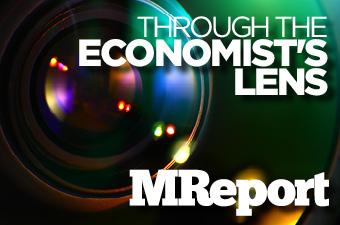At the end of the classic ""Miracle on 34th Street,"" Fred Gailey--fresh from proving department store Santa Kris Kringle is _the_ Santa Claus--muses aloud, ""Maybe I didn't do such a wonderful thing after all"" when (spoiler alert) he spots Kringle's cane in a vacant, for-sale house his soon-to-be stepdaughter Susie has dreamed of.
[IMAGE]In the same vein, perhaps critics of sequester may not have been doing such a ""wonderful thing"" when they argued that across-the-board cuts would have a crippling effect on the nation's economy because of the importance of government spending's ripple effect.
Those critics, of course, had statistics on their side. In the last three years, increases in government spending led to acceptable--though far from robust--overall economic growth, while decreases did not.
In the first 15 quarters since the end of the Great Recession in mid-2009, federal spending has declined quarter-over-quarter seven times and increased eight. The average economic growth as measured by gross domestic product (GDP) during the ""down"" quarters was just under 1.5 percent (1.45 percent for those seeking greater precision). In the eight quarters in which federal spending rose, growth averaged 2.79 percent--not a cause for fireworks, but not embarrassing or threatening either. So, the sequester critics warned, cuts in government spending will slow the economy and threaten the fragile recovery.
Sequester cuts began March 1, the third month of the first quarter. Federal spending dropped 8.4 percent, and the economy grew at just 1.1 percent, better than the 0.1 percent growth in the preceding quarter, but still a cause for concern.
Just wait until the second quarter--three full months of sequester cuts, the critics (a.k.a doomsayers) predicted. Indeed, while the sky didn't quite fall when the first report for second quarter GDP was released, the critics seemed to be on target. GDP, according to the Bureau of Economic Analysis (BEA), grew at just 1.7 percent as federal spending dropped yet another 1.5 percent. But then came this week's revised GDP estimate: Federal spending fell by even more, a revised 1.6 percent, and the overall economy grew by (still waiting for a drumroll) 2.5 percent.
Huh?
Now a 2.5 percent growth rate isn't great, but let's look at the trend: 0.1 percent in the pre-sequester fourth quarter 2012, 1.1 percent in the partial sequester first quarter 2013 and 2.5 percent in the full sequester second quarter--more than double the first quarter growth.
What's wrong with this picture?
The news could not have come at a worse time for the Obama Administration, as deficit hawks threaten to shut down the government unless they win more spending concessions through agreement with the White House. At the same time, the White House is trying to fend off threats to not increase the nation's borrowing limit with Republicans seeking a repeal or defunding of the Affordable Care Act as their price to allow the government to stay in business.
[COLUMN_BREAK]Think of it as Fiscal Cliff II.
While the ACA is the symbolic, signature achievement of the Obama Administration, the White House has been trying to argue about the effects of further cuts in government spending and the impact those cuts would have on the economy.
Then came the BEA report on GDP.
[By the way, it is mildly interesting that the Republicans--who were shouting conspiracy and freely hurling accusations that books were being cooked when the Bureau of Labor Statistics reported a sharp drop in the unemployment rate during the presidential campaign--have been silent in the wake of the latest BEA report with numbers to their advantage.]GDP, to be sure, is more complex than federal spending. Recall Economics 101, which offered a formula for GDP: C (Personal Consumption Spending), plus I (Investment), plus G (Government), plus or minus net exports (a positive if exports exceed imports, a negative if imports are greater).
In fact, updated export/import data led to the revision of second quarter GDP. In the first report, imports exceeded exports, in the second, exports were greater.
That government spending had no impact is almost--to deficit hawks--irrelevant.
A real dispute remains over whether to reverse the sequester cuts--which have contributed to a lower deficit--and how.
Republicans have offered to replace the bulk of the sequester cuts--$518 billion over eight years--with other, more targeted cuts to Medicare, Medicaid, and other entitlement programs, according to news reports. They offered to raise revenues to reduce the deficit, the reports said, but not, as the White House wanted, to replace the sequester.
Of course the Republican proposal is a non-starter for Democrats (just as most Democratic proposals would be a non-starter for Republicans).
The reason the impact of the March 1 sequester was muted was because it came in the middle of a fiscal year, when astute managers could use furloughs and other temporary measures to achieve budget cuts. When the sequester comes at the beginning of the year, October 1, when the cuts have to be in place for the entire fiscal year, the story could and will be different.
More dangerous is that Republicans, emboldened by the limited impact of the sequester cuts, might adopt a wait-and-see approach to the nation's debt ceiling and not vote to increase it to see what might happen.
That's playing with fire by calling into question not the nation's ability to pay its debts, but its willingness. In bank lending decisions, different institutions apply the three, five, or nine ""Cs"" of credit. The number varies with the whim of the lender. One of the ""Cs"" is usually ""Character,"" which speaks to the willingness to repay a debt, even if the borrower has the Capacity to pay.
Playing with the nation's Character would not be a _wonderful_ thing.
_Hear Mark Lieberman next Friday on POTUS radio (Sirius-XM 124) at 8:45 a.m. and again at 12:05 p.m. Eastern._
*_Want to write an opinion piece for publication on our site? Send your submission to_* ""[email protected]."":mailto:[email protected]

 theMReport.com Your trusted source for mortgage banking news
theMReport.com Your trusted source for mortgage banking news









